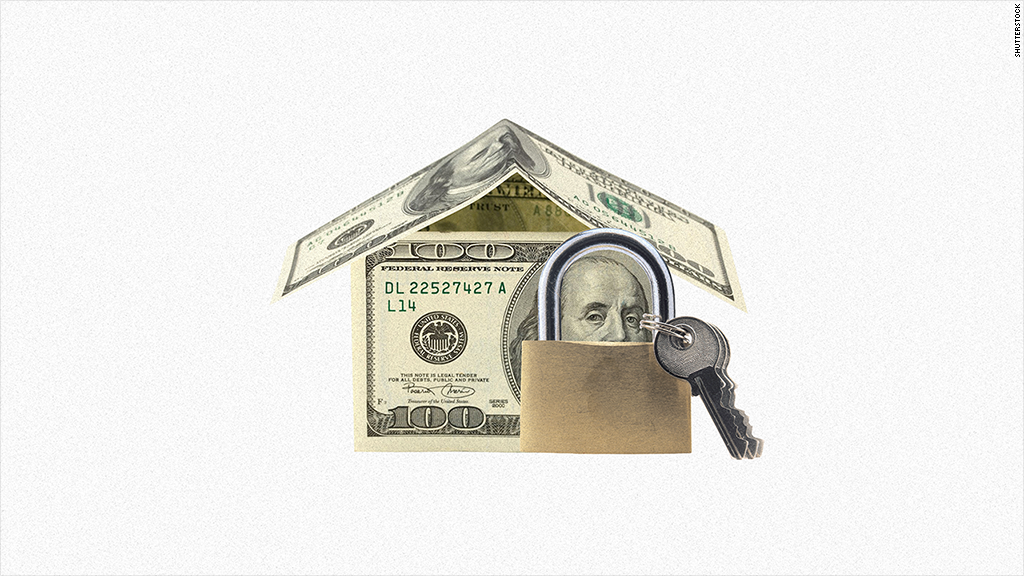
During the housing bust, many homeowners were cut off from a popular source of funds: their homes.
But as home prices recover, more people have been able to tap their home's equity to pay for renovations, consolidate debts or help pay for other big ticket items.
Home equity lines of credit were up 27% during the year ended June 30, according to financial services company Experian and consulting firm Oliver Wyman. And more people are expected to follow suit.
But does that mean a home equity loan (HEL) or home equity line of credit (HELOC) is right for you? Here are five things you need to consider.
1. Rates
In recent years, mortgage rates have hovered near historic lows -- with nearly 9 million borrowers getting 30-year fixed mortgages at or below 4%, according to CoreLogic.
Now rates are expected to rise.
"We may be in for a more volatile period," said Keith Gumbinger, of HSH.com, a mortgage information firm. Coming to an end next month are several of the Federal Reserve's efforts to keep rates low under its quantitative easing monetary policy, he noted.
So if you are one of the borrowers who locked in an ultra-low rate in the past few years, a home equity loan or HELOC could save you more money than refinancing the entire mortgage through a cash-out refinance.
Related: Best cities for Millennial buyers
If you refinance your loan now, you're likely to pay a rate that is as much as a percentage point higher than your original loan. And you will be paying that rate on the entire loan balance.
"Somebody who has a 3.5% first mortgage is not going to do a cash-out refinance at 5.5% unless they absolutely have to," said Greg McBride, senior financial analyst for BankRate.com.

While rates on home equity loans tend to be a couple of percentage points higher, you will only be paying that higher rate on a fraction of your total loan balance.
HELOCs tend to offer competitive rates, but they are often adjustable, meaning there is a risk they will rise. Again, you will only pay the higher rate on the amount of credit you've taken out.
2. Costs
The price you'll pay upfront to get a home equity loan or HELOC is far cheaper than refinancing.
That's because many lenders make you go through the full underwriting process when you refinance -- and they charge all the fees that go along with that process, too.
How much do you know about mortgages?
You can expect to pay inspection and attorney review fees, for example, and you will have to get a new title search and insurance, which can typically cost $1,000 or more, depending on the size of your mortgage. In total, all of those upfront costs of refinancing can put you back two to three grand depending on the size of your loan.
Meanwhile, some lenders issue home equity loans or lines of credit with no upfront costs; borrowers pay for their application, appraisal and other fees by paying a higher interest rate.
3. Time
When you take out a home equity loan or HELOC, you keep making your payments on the same payment schedule.
When you refinance a loan, however, the clock resets.
Quiz: Are you a homebuying genius?
So even if you've paid 30 months on a 30-year loan and then refinance, when you make your first payment on the new loan it will be like starting at day one of the 30-year term.
However, if you opt to roll the 30-year loan into a 15-year one, that would then reduce the number of payments you make but increase the amount of your payments each month.
4. What the loan or line of credit is for
The best reason to take out a home equity loan is when it has some positive impact on your finances. Using it to pay for a renovation that adds value to your property, for example, or to pay for an advanced degree that can increase your earning power.
Of course, there are times when borrowing against your home doesn't make sense.
It can be foolish to tap your home's equity for nonessential spending, for example. Using home equity to buy a Mercedes, pay for a luxury vacation or make some other discretionary purchase can be a foolish move. The money will be gone and you will be paying off the debt for years to come.
Draining your home of equity can also put you on the road to foreclosure. Run into unexpected expenses and there's one less source of funds to tap.
5.Tax benefits
Just like first mortgages, certain home equity loans and HELOCs are eligible for the home mortgage interest deduction. Borrowers can deduct up to $100,000 of interest paid on a mortgage's principal.
That's not always the case when you pursue a cash-out refinance.


